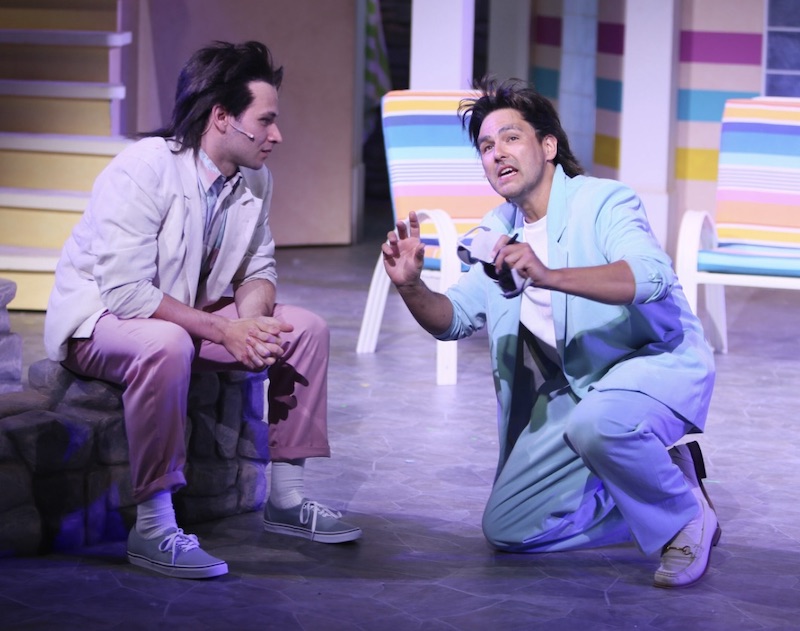The play is slight. Director Dean Paul Gibson’s production is inconsistent. And young actor Jacob Leonard is a star.
If The Two Gentlemen of Verona hadn’t been written by Shakespeare, I can’t imagine it would still be getting produced today. In the simple and problematic plot, Proteus, who has declared his undying love for Julia, follows his best friend Valentine from their home in Verona to Milan, where he discovers that Valentine has fallen in love with Silvia. But, as soon as Proteus lays eyes on Silvia, he wants her and, deciding that his first obligation is to himself, he abandons his commitment to Julia and sets his sites on Valentine’s betrothed. “In love who respects friends?” he asks.
Later, when Proteus encounters Silvia in the forest, and she spurns him, calling him dishonourable, Proteus declares that “… if the gentle spirt of moving words/Can no way change you to a milder form,/I’ll woo you like a solder, at arms’ end,/And love you ‘gainst the nature of love — force you.” Proteus sets out to rape Silvia.
Fortunately, Valentine interrupts him. But wait, there’s more! After Proteus’s apology of five short lines, Valentine not only forgives his faithless, sexually violent friend, he adds, “And that my love may appear plain and free,/All that is mine in Sylvia, I give thee.”
The lovers end up in their “proper” configurations, Proteus with Julia and Valentine with Silvia, but the women have no say in this. They are chattel and their fates are determined by men.
Borrowing a device I first saw director Scott Bellis employ in a Bard on the Beach production of Two Gentlemen eight years ago, director Gibson reconfigures this resolution so that, instead of marrying their oblivious, entitled fiancés, Julia and Silvia join a band of female outlaws. Fair enough: this script screams out for correction.
But the more significant and original accomplishment in this production is Jacob Leonard’s performance as Proteus. Against all odds, Leonard makes this dickhead charming. Partly, that’s because Leonard delivers the text so well, making clear and impressively casual sense of it. And partly it’s because he presents the character’s baseness with a bemused detachment that reels us into his point of view. The night I saw this show, when Proteus told the audience that he was dumping Julia and described her as “a plain and wretched shrew”, the audience groaned in loud disapproval, but he replied with a smile and shrug that said, “What? Why so judgy?” — and earned a laugh for it.
Operating on a different but complementary wavelength, Tess Degenstein is also particularly successful as Julia — wild-eyed, impulsive, and innocent.
Playing Valentine, Matthew Ip Shaw gets a bit shouty in the emotional high points, but he does a mostly solid, straightforward job. I was a hazy on the conception of Agnes Tong’s Silvia: under Gibson’s direction, she seems like a callous party girl at first, which is at odds with the character as written. And, although Angus Yam works hard to be spritely as Valentine’s servant, Speed, the forced gaiety does little to illuminate the character’s wit — although I don’t know if I’ve ever seen Speed’s wordplay fire.
The scene between the play’s other clown, Proteus’s servant Launce, and his dog Crab falls flat, partly because the dog is miscast — which is a clause I never thought I’d write. The gist of the interaction is that Launce is berating Crab for showing no emotion when Launce was forced to part from his family to follow Proteus to Milan. The scene works when the dog appears to disdain Launce and, if that’s the vibe you’re going for, you do not cast a yellow lab: as a breed, they’re too obviously openhearted. To be fair, I saw the understudy, Taj, play Crab, but Mason, who usually plays the role, is also a yellow lab. Wrong breed. You want a hound.
Gibson has set his production in the 80s, and the designers step up. Pam Johnson’s set pretends to have a swimming pool and Carmen Alatorre’s costumes revel in pastels and loud patterns. Malcom Dow’s sound design includes multiple period references, and there are other in-jokes throughout the production. All of this serves the superficiality of the world of Two Gentlemen, but the superficiality remains — and it’s not very interesting.
THE TWO GENTLEMEN OF VERONA by William Shakespeare. Directed by Dean Paul Gibson. A Bard on the Beach production running in rep on the BMO Mainstage until September 19. (Tickets and information)
PHOTO CREDIT: (Photo of Jacob Leonard, left, and Matthew Ip Shaw. Set by Pam Johnson. Costumes by Carmen Alatorre. Photo by Tim Matheson)
BUT WAIT! THERE’S MORE! You can get all my current reviews PLUS curated local, national, and international arts coverage in your inbox FREE every week if you subscribe to Fresh Sheet, the Newsletter. Just click that link. (Unsubscribe at any time. Super easy. No hard feelings.) Check it out.






0 Comments